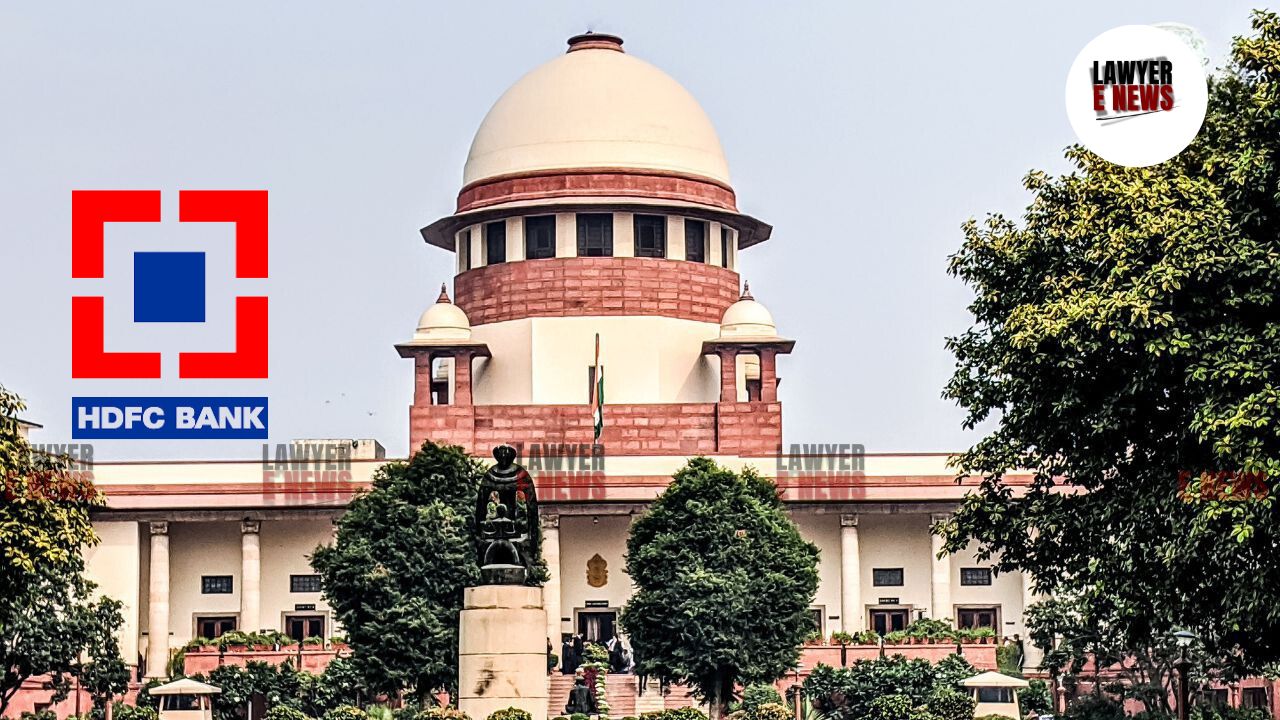-
by Admin
15 February 2026 5:35 AM



Today, In a significant ruling on October 22, 2024, the Supreme Court of India quashed an FIR filed against HDFC Bank officials for allegedly breaching an Income Tax Department’s restraining order by allowing the operation of a customer’s sealed locker. The Court found no criminal intent or fraudulent behavior on the part of the bank officials, ruling that mere inadvertence without mens rea (criminal intent) does not constitute a criminal offense.
This ruling, delivered in HDFC Bank Ltd. v. The State of Bihar & Ors., underscores the need for establishing intent when prosecuting financial institutions and their employees for alleged breaches of legal orders. The judgment provides a major precedent for safeguarding businesses against undue criminal prosecutions in cases of genuine mistakes.
The case stems from an October 2021 search and seizure operation conducted by the Income Tax Department under Section 132(1) of the Income Tax Act, 1961, targeting several individuals, including Smt. Sunita Khemka. The operation revealed that Khemka held a locker at the Exhibition Road Branch of HDFC Bank in Patna.
On October 5, 2021, a prohibitory order under Section 132(3) of the Income Tax Act was issued, barring the operation of bank accounts, lockers, and fixed deposits linked to Khemka and other individuals. The HDFC Bank branch was instructed to strictly comply with the order, and any violation could result in penalties under Section 275A of the Income Tax Act.
However, on November 9, 2021, Khemka was allowed to access her locker by the bank officials, based on their interpretation of a subsequent order dated November 1, 2021, which partially lifted restrictions on certain bank accounts but did not explicitly mention the locker. The misunderstanding led the bank to believe that the locker could also be accessed. When this action was discovered during a subsequent search on November 20, 2021, the Deputy Director of Income Tax lodged a complaint, leading to the registration of an FIR against the bank officials for various offenses under the Indian Penal Code (IPC), including criminal conspiracy (Section 120B), cheating (Section 420), and criminal breach of trust (Sections 406 and 409).
The central issue before the Court was whether the bank officials had acted with criminal intent when they allowed Khemka to access her locker in violation of the restraining order. HDFC Bank, represented by Senior Counsel Neeraj Kishan Kaul, argued that the bank officials had misinterpreted the November 1, 2021, revocation order and acted under a bona fide mistake. There was no dishonest intent or mens rea to commit any criminal offense.
Kaul further contended that the FIR failed to disclose any specific allegations of fraudulent inducement or misappropriation of property, which are essential to establish offenses under Sections 420 and 409 of the IPC. He also referenced key Supreme Court rulings, including State of Haryana v. Bhajan Lal and Arnab Manoranjan Goswami v. State of Maharashtra, to argue that criminal proceedings in such cases should be quashed when no prima facie case is made out.
The Supreme Court, in a bench comprising Justice B.R. Gavai and Justice K.V. Viswanathan, scrutinized the facts and the FIR in detail. The Court concluded that the allegations did not establish any criminal intent on the part of the bank officials.
"The FIR does not show that the appellant-bank had induced anyone since inception," the Court observed. It further emphasized that for charges of cheating under Section 420 IPC to stand, there must be clear evidence of fraudulent inducement and dishonest intention, both of which were absent in this case.
The Court also dismantled the accusations of criminal breach of trust under Sections 406 and 409 IPC, pointing out that there was no allegation or evidence that HDFC Bank or its officials had misappropriated any property entrusted to them. "There is not even an allegation of entrustment of the property which the appellant-bank has misappropriated or converted for its own use," the Court noted.
In addressing the key principle of mens rea, the Court reiterated that criminal liability cannot be imposed without proof of a guilty mind. The Court noted that the bank officials had simply misunderstood the scope of the November 1, 2021, revocation order, which only allowed access to bank accounts but did not cover lockers. The officials acted without any intention to violate the law.
The Supreme Court's ruling highlighted the principle that criminal proceedings should be quashed in cases where the allegations, even if taken at face value, do not disclose the ingredients of the alleged offenses. Relying on the landmark judgment in Bhajan Lal, the Court emphasized that allowing criminal cases to proceed in the absence of a prima facie case would cause unnecessary hardship and misuse of the judicial process.
The Supreme Court quashed both the High Court’s judgment and the FIR registered against HDFC Bank officials, ruling that the prosecution lacked any evidence of criminal intent or fraudulent inducement. "We are of the considered view that the continuation of the criminal proceedings against the appellant-bank would cause undue hardship to the appellant-bank," the Court declared in its final order.
This judgment serves as a reminder that banks and financial institutions should not be subjected to criminal proceedings based on mere procedural errors or misunderstandings, unless there is clear evidence of fraudulent intent.
Date of Decision: October 22, 2024
HDFC Bank Ltd. v. The State of Bihar & Ors.,
